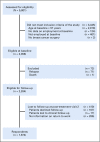Impact of Breast Cancer Treatment on Employment: Results of a Multicenter Prospective Cohort Study (CANTO)
- PMID: 31834818
- PMCID: PMC7048162
- DOI: 10.1200/JCO.19.01726
Impact of Breast Cancer Treatment on Employment: Results of a Multicenter Prospective Cohort Study (CANTO)
Abstract
Purpose: Adverse effects of breast cancer treatment can negatively affect survivors' work ability. Previous reports lacked detailed clinical data or health-related patient-reported outcomes (PROs) and did not prospectively assess the combined impact of treatment and related sequelae on employment.
Methods: We used a French prospective clinical cohort of patients with stage I-III breast cancer including 1,874 women who were working and ≥ 5 years younger than legal retirement age (≤ 57 years) at breast cancer diagnosis. Our outcome was nonreturn to work (non-RTW) 2 years after diagnosis. Independent variables included treatment characteristics as well as toxicities (Common Toxicity Criteria Adverse Events [CTCAE] v4) and PROs (European Organization for Research and Treatment of Cancer [EORTC] Quality of life Questionnaires, Breast cancer module [QLQ-BR23] and Fatigue module [QLQ-FA12], Hospital Anxiety and Depression Scale) collected 1 year after diagnosis. Logistic regression models assessed correlates of non-RTW, adjusting for age, stage, comorbidities, and socioeconomic covariates.
Results: Two years after diagnosis, 21% of patients had not returned to work. Odds of non-RTW were significantly increased among patients treated with combinations of chemotherapy and trastuzumab (odds ratio [OR] v chemotherapy-hormonotherapy: for chemotherapy-trastuzumab, 2.01; 95% CI, 1.18 to 3.44; for chemotherapy-trastuzumab-hormonotherapy, 1.62; 95% CI, 1.10 to 2.41). Other significant associations with non-RTW included grade ≥ 3 CTCAE toxicities (OR v no, 1.59; 95% CI, 1.15 to 2.18), arm morbidity (OR v no, 1.59; 95% CI, 1.19 to 2.13), anxiety (OR v no, 1.47; 95% CI, 1.02 to 2.11), and depression (OR v no, 2.29; 95% CI, 1.34 to 3.91).
Conclusion: Receipt of systemic therapy combinations including trastuzumab was associated with increased odds of non-RTW. Likelihood of unemployment was also higher among patients who reported severe physical and psychological symptoms. This comprehensive study identifies potentially vulnerable patients and warrants supportive interventional strategies to facilitate their RTW.
Figures


References
-
- De Angelis R, Sant M, Coleman MP, et al. Cancer survival in Europe 1999-2007 by country and age: Results of EUROCARE--5-a population-based study. Lancet Oncol. 2014;15:23–34. - PubMed
-
- GLOBOCAN (IARC): Population fact sheets, Europe, 2018 http://gco.iarc.fr/today/data/factsheets/populations/908-europe-fact-she....
-
- de Boer AGEM, Taskila T, Ojajärvi A, et al. Cancer survivors and unemployment: A meta-analysis and meta-regression. JAMA. 2009;301:753–762. - PubMed
-
- Surveillance Epidemiology, and End Results Program (SEER): Cancer Stat Facts: Female Breast Cancerhttps://seer.cancer.gov/statfacts/html/breast.html
-
- Mehnert A, de Boer A, Feuerstein M. Employment challenges for cancer survivors. Cancer. 2013;119(suppl 11):2151–2159. - PubMed
Publication types
MeSH terms
LinkOut - more resources
Full Text Sources
Medical
Miscellaneous

